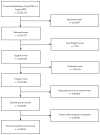Examining the Prevailing Negative Sentiments Related to COVID-19 Vaccination: Unsupervised Deep Learning of Twitter Posts over a 16 Month Period
- PMID: 36146535
- PMCID: PMC9503543
- DOI: 10.3390/vaccines10091457
Examining the Prevailing Negative Sentiments Related to COVID-19 Vaccination: Unsupervised Deep Learning of Twitter Posts over a 16 Month Period
Abstract
Despite the demonstrated efficacy, safety, and availability of COVID-19 vaccines, efforts in global mass vaccination have been met with widespread scepticism and vaccine hesitancy or refusal. Understanding the reasons for the public's negative opinions towards COVID-19 vaccination using Twitter may help make new headways in improving vaccine uptake. This study, therefore, examined the prevailing negative sentiments towards COVID-19 vaccination via the analysis of public twitter posts over a 16 month period. Original tweets (in English) from 1 April 2021 to 1 August 2022 were extracted. A bidirectional encoder representations from transformers (BERT)-based model was applied, and only negative sentiments tweets were selected. Topic modelling was used, followed by manual thematic analysis performed iteratively by the study investigators, with independent reviews of the topic labels and themes. A total of 4,448,314 tweets were analysed. The analysis generated six topics and three themes related to the prevailing negative sentiments towards COVID-19 vaccination. The themes could be broadly understood as either emotional reactions to perceived invidious policies or safety and effectiveness concerns related to the COVID-19 vaccines. The themes uncovered in the present infodemiology study fit well into the increasing vaccination model, and they highlight important public conversations to be had and potential avenues for future policy intervention and campaign efforts.
Keywords: COVID-19; machine learning; negative sentiment; sentiment analysis; vaccines.
Conflict of interest statement
The authors declare no conflict of interest.
Figures




Similar articles
-
Examining the Prevailing Negative Sentiments Surrounding Measles Vaccination: Unsupervised Deep Learning of Twitter Posts from 2017 to 2022.Cyberpsychol Behav Soc Netw. 2023 Aug;26(8):621-630. doi: 10.1089/cyber.2023.0025. Epub 2023 Jun 26. Cyberpsychol Behav Soc Netw. 2023. PMID: 37358808
-
Examining the Utility of Social Media in COVID-19 Vaccination: Unsupervised Learning of 672,133 Twitter Posts.JMIR Public Health Surveill. 2021 Nov 3;7(11):e29789. doi: 10.2196/29789. JMIR Public Health Surveill. 2021. PMID: 34583316 Free PMC article.
-
Examining the Negative Sentiments Related to Influenza Vaccination from 2017 to 2022: An Unsupervised Deep Learning Analysis of 261,613 Twitter Posts.Vaccines (Basel). 2023 May 23;11(6):1018. doi: 10.3390/vaccines11061018. Vaccines (Basel). 2023. PMID: 37376407 Free PMC article.
-
Examining Public Sentiments and Attitudes Toward COVID-19 Vaccination: Infoveillance Study Using Twitter Posts.JMIR Infodemiology. 2022 Apr 15;2(1):e33909. doi: 10.2196/33909. eCollection 2022 Jan-Jun. JMIR Infodemiology. 2022. PMID: 35462735 Free PMC article.
-
Vaccine sentiment analysis using BERT + NBSVM and geo-spatial approaches.J Supercomput. 2023 May 7:1-31. doi: 10.1007/s11227-023-05319-8. Online ahead of print. J Supercomput. 2023. PMID: 37359330 Free PMC article.
Cited by
-
Social interactions and COVID-19 vaccine hesitancy: Evidence from a full population study in Sweden.PLoS One. 2023 Nov 20;18(11):e0289309. doi: 10.1371/journal.pone.0289309. eCollection 2023. PLoS One. 2023. PMID: 37983227 Free PMC article.
-
Evaluation of Transplacental Antibody Transfer in Pregnant Women Immunized with Different SARS-CoV-2 Homologous or Heterologous Schemes.Vaccines (Basel). 2023 Feb 11;11(2):415. doi: 10.3390/vaccines11020415. Vaccines (Basel). 2023. PMID: 36851294 Free PMC article.
-
COVID-19 Vaccine Acceptance during Pregnancy and Influencing Factors in South Korea.J Clin Med. 2022 Sep 28;11(19):5733. doi: 10.3390/jcm11195733. J Clin Med. 2022. PMID: 36233601 Free PMC article.
-
Effectiveness of the Booster of SARS-CoV-2 Vaccine among Japanese Adolescents: A Cohort Study.Vaccines (Basel). 2022 Nov 12;10(11):1914. doi: 10.3390/vaccines10111914. Vaccines (Basel). 2022. PMID: 36423011 Free PMC article.
-
Public perception on 'healthy ageing' in the past decade: An unsupervised machine learning of 63,809 Twitter posts.Heliyon. 2023 Jan 21;9(2):e13118. doi: 10.1016/j.heliyon.2023.e13118. eCollection 2023 Feb. Heliyon. 2023. PMID: 36747557 Free PMC article.
References
-
- Piedrahita-Valdés H., Piedrahita-Castillo D., Bermejo-Higuera J., Guillem-Saiz P., Bermejo-Higuera J.R., Guillem-Saiz J., Sicilia-Montalvo J.A., Machío-Regidor F. Vaccine Hesitancy on Social Media: Sentiment Analysis from June 2011 to April 2019. Vaccines. 2021;9:28. doi: 10.3390/vaccines9010028. - DOI - PMC - PubMed
LinkOut - more resources
Full Text Sources
Miscellaneous

